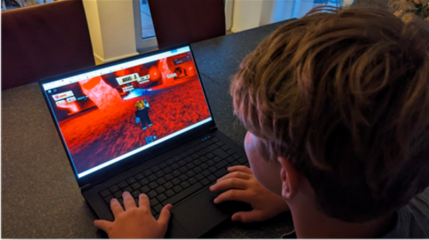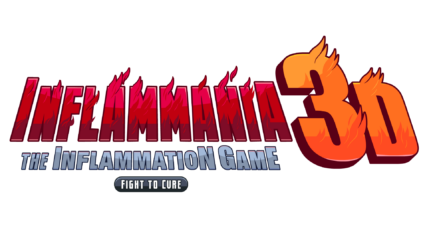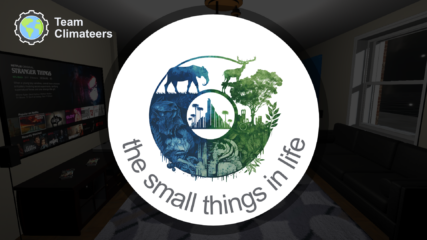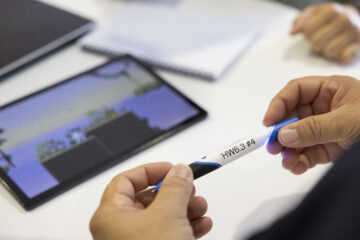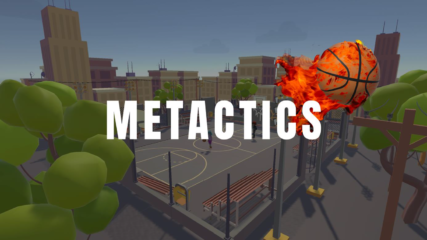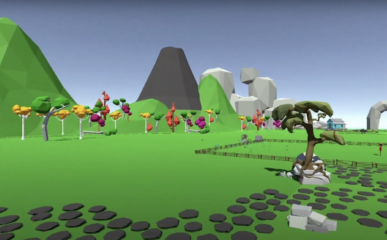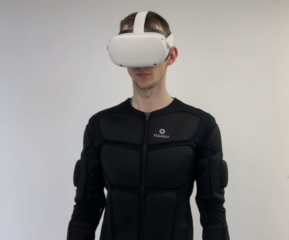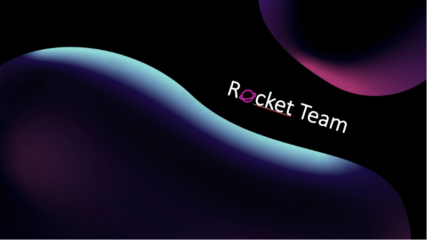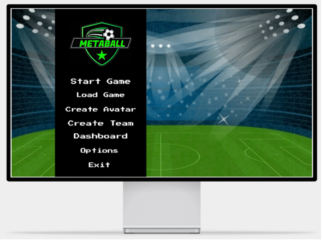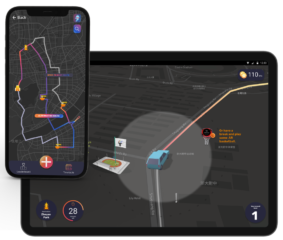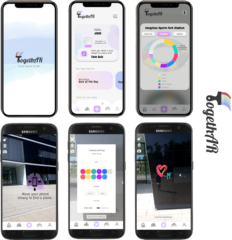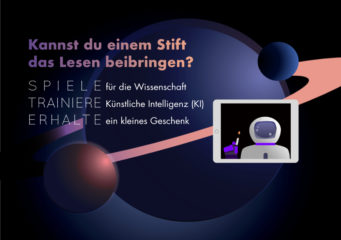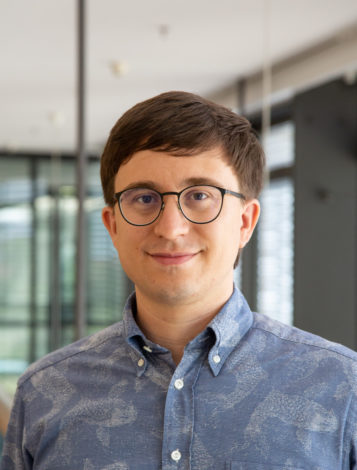Index
CUBEness
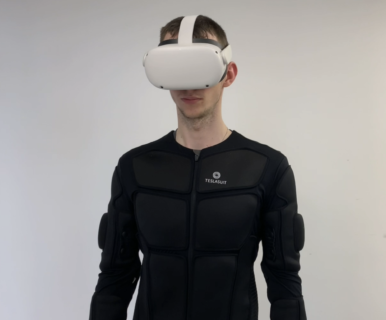
Herausforderung: In den letzten Jahren ist die Erkundung des Weltraums wieder zu einem Trendthema geworden. Verschiedene private Organisationen wie SpaceX, Blue Origin oder Virgin Galactic und Regierungsorganisationen aus den USA, China, Indien, Europa oder Russland konkurrieren um die Vorherrschaft im Weltraum. Neben der Erforschung neuer Welten ebnet dieser Trend den Weg für Innovationen, die auch unser Leben auf der Erde verändern werden. Zum Beispiel werden immer mehr Satelliten in den Orbit geschickt, die unsere Erde umkreisen und neue Möglichkeiten für die Erdbeobachtung oder flächendeckendes Highspeed-Internet ermöglichen. Dies bietet neue Herausforderungen und Möglichkeiten, welche mit Ansätzen aus dem Gaming und Gamification angegangen werden können. Daher lautete die Aufgabe des Kurses Designing Gamified Systems in diesem Semester:
Design an innovative game or gamification approach in which gaming, space technology and mobility meets in order to either A) improving life on earth or B) improving life in space.
Datum: Wintersemester 2021/2022
Vorlesung: Designing Gamified Systems
Projektergebnisse:
CUBEness
Team: Heschu Qarani, Jonathan Stief, Sherwet Galal, Cem Karatasan, Gerrit Sußner
Abstract:
The interest in space is constantly increasing: From space agencies planning longer projects, such as NASAs’ Artemis mission, to private companies such as SpaceX planning to put humans on Mars. Overall, the private sector of space tourism is projected to reach a total of US$1.7 Billion by 2027. The market will expand much further in the future, with long-term missions becoming increasingly frequent.
Yet these long-term missions pose significant strains on both the human body and the mind. First among them is the deterioration of muscles, muscle atrophy, and the cardiovascular system through microgravity. These effects are so severe that even short missions (< 30 days) can cause a muscle volume loss of 5.5 to 15.9 percent. In order to combat these effects, most space agencies employ in-flight exercises of about 2.5 hours six days a week. Secondly, space missions represent the “perfect boring situation” and can invoke mental health issues.
Our VR solution addresses both aspects equally, as it gamifies the required exercise to avoid physical consequences, as well as challenge the players mentally and provides opportunities for experiencing social relatedness. For this, it uses both state-of-the-art VR equipment, as well as a Teslasuit, to not only make the experience feel even more immersive through haptic feedback, as well as the possibility to enhance training effects. The main game consists of resource collection during the exercise and a base-building type game in the phases between workouts. Both take place in VR.
In order to overcome the dullness of the monotonous environment, the game features a story putting the players in a scenario in 2075, where Mars has been colonized, and it is now their shared mission to defend and extend the colony. However, players need to collect resources through exercise to repair and build further modules, which is conducted within the VR game.
In the story mode, they are guided through their exercise by story-related messages, collecting resources while traversing the base and the landscapes of Mars. As voluntariness represents an important point in the acceptance of gamified approaches, however, players also have the option to avoid the story. While exercising, they collect resources by swiping them to the side with their controller. From the collected resources they then have the possibility to build three different types of buildings: (1) shelter domes, which set the defense for the whole colony, (2) windmills, which produce electricity for the colony, (3) greenhouses, which produce oxygen. To increase complexity, create fun, and challenge players mentally, the electricity and oxygen stats must match the shelter, or the colony will be dysfunctional, and the defense will receive a debuff. Players will have to ready their bases for increasingly difficult challenges, such as further alien attacks, sand storms, and similar difficulties that life on Mars would bring. This aims to create a long-time engagement in the player, relying on the immersion and social interaction between the crewmates of the space mission to defend their shared colony.
We use a Teslasuit, a smart textile two-piece full bodysuit, to make the experience immersive and interactive. The suit provides haptic feedback, captures motion and biometric functions. Further, a full-body haptic feedback system is built into the suit with 80 electrostimulation channels, which could be used to provide instant feedback on the players‘ performance within the game. It can be functionalized in response to motion capture comparison at any time. No additional equipment will be need. The approach may be used with existing training equipment in space stations such as the ISS.
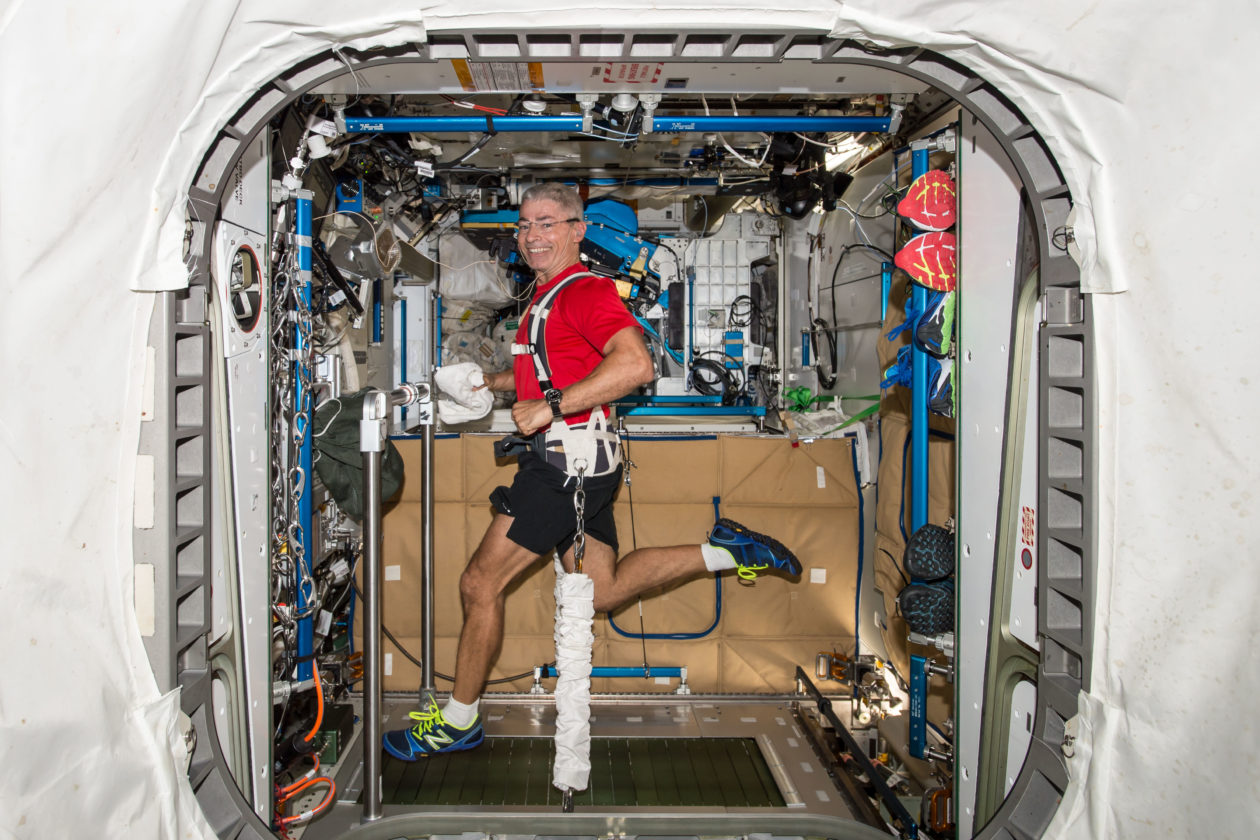
Studierendenprojekte
Das Lehrangebot unserer Forschungsgruppe richtet sich an Studierende der Wirtschaftsinformatik mit einem Interesse in den Bereichen Mensch-Computer-Interaktion, Gamifizierung und Game-Design. Unsere Vorlesungen legen einen besonderen Schwerpunkt auf die Gestaltung gamifizierter Systeme, dabei verbindet unser Lehrangebot Theorie und Praxis durch den Einbezug modernster theoretischer und methodischer Konzepte in Kombination mit praxisorientierten Fragestellungen, Beispielen und einer Projektarbeit in Gruppen.
Nach dem Konzept des herausforderungsbasierten Lernens (Challenged-based Learning) setzen sich Studierende in den meisten unserer Vorlesungen mit praxisorientierten Fragestellungen auseinander, um ihr gelerntes theoretisches Wissen auf reale Situationen anzuwenden und zu vertiefen. Im Folgenden bieten wir einen Überblick über ausgewählte Projektergebnisse der Studierenden.
Forschungsprojekte

PRIME – Privatheit im Metaversum

Das Metaversum (engl. Metaverse) wird als eine mögliche nächste Entwicklungsstufe des Internets betrachtet. Während Tech-Konzerne das gewaltige ökonomische Potenzial des Metaversums hervorheben, birgt diese Technologie auch neue Gefahren für die Privatsphäre der potenziellen Nutzerinnen und Nutzer.
Vor diesem Hintergrund zielt das Forschungsvorhaben „PRIME – Privatheit im Metaversum“ darauf ab, in der aktuellen Frühphase der Entwicklung von Metaverse-Plattformen Wissen zu erarbeiten, um Bürgerinnen und Bürgern einen informierten Diskurs über die Chancen und Risiken der Verwendung von Metaverse-Plattformen für ihre Privatheit, Selbstbestimmtheit und ihren Datenschutz zu ermöglichen. Weiter zielt das Vorhaben auf die Erarbeitung neuer Methoden und Gestaltungsansätze, welche Entwicklerinnen und Entwickler von Inhalten und Services auf Metaverse-Plattformen beim Schutz der Privatsphäre von Nutzerinnen und Nutzern unterstützen.
Das vom Bundesministerium für Bildung und Forschung (BMBF) für 36 Monate geförderte Verbundprojekt wird von unserer Forschungsgruppe an der FAU in enger Zusammenarbeit mit Prof. Dr. Christian Thorun der ConPolicy GmbH in Berlin, Prof. Dr. Louisa Specht-Riemenschneider von der Universität Bonn, Prof. Dr. Gerald Spindler von der Universität Göttingen vorangetrieben. Im Detail verfolgt das Vorhaben die folgenden Schwerpunkte:
- Design und Evaluation von Benutzerschnittstellen und Designpraktiken, die es Nutzerinnen und Nutzern von Metaverse-Plattformen ermöglichen, ihr Recht auf Privatsphäre effektiv wahrzunehmen und u.a. ihre Einwilligungen angemessen zu unterstützen und sich vor Belästigungen und Übergriffen zu schützen.
- Entwicklung und Testung von Metriken zur Bewertung des Designs von virtuellen Inhalten auf Metaverse-Plattformen hinsichtlich ihrer Auswirkung auf die Privatsphäre der Nutzerinnen und Nutzer, um u.a. Dark Patterns und Deceptive Designs im Metaversum Einhalt zu gebieten.
- Erforschung und Erprobung von innovativen Gestaltungs- und Entwicklungsprozessen zur Erhebung der Meinungen von Nutzerinnen und Nutzern von Metaverse-Inhalten hinsichtlich der genannten Benutzerschnittstellen und Metriken sowohl mittels klassischer Methoden der Usabilty-Forschung als auch mit Hilfe von Methoden, die im Metaversum selbst eingesetzt werden.
Das Forschungsvorhaben setzt auf eine breite Öffentlichkeitsarbeit und die Kooperation mit regionalen Partnern, wie dem offenen Innovationslabor JOSEPHS in Nürnberg, dem XR Hub Bavaria, Games in Bavaria, oder der Journee Technologies GmbH.
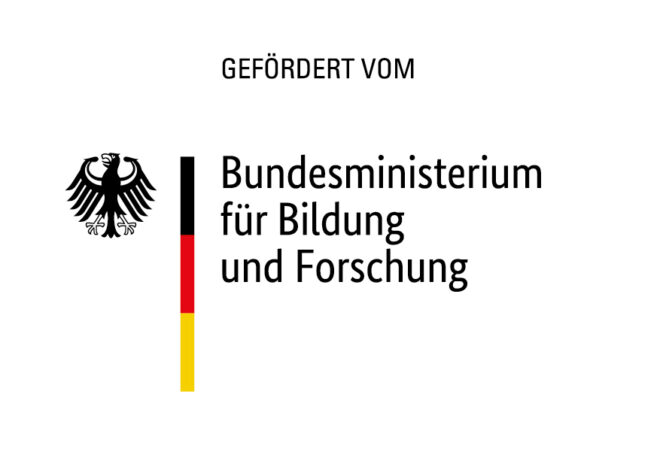
Förderkennzeichen: 16KIS1895
Laufzeit: 1. Juli 2023 – 31. Juni 2026
Weitere Informationen:
– https://privacy-metaverse.de
– https://www.forschung-it-sicherheit-kommunikationssysteme.de/projekte/prime
Team: Jeanine Kirchner-Krath, Runjie Xie

eCo-CreAItion: Erforschung der Gestaltung von Mensch-KI Ko-Kreativität für Nachhaltigkeitsinnovationen
Die Digitalisierung beeinflusst alle Bereiche des gesellschaftlichen und wirtschaftlichen Lebens, und insbesondere Künstliche Intelligenz (KI) als disruptive Technologie verändert fundamental, wie Menschen mit Technologien zusammenarbeiten. Gleichzeitig stehen wir vor kritischen gesellschaftlichen Herausforderungen, die es mit neuen Ideen und Innovationsgeist zu lösen gilt. Hierbei verspricht die Integration von KI in kreative Prozesse, sogenannte Mensch-KI Ko-Kreativität, neue Innovationswege zu öffnen, um Lösungen für drängende Herausforderungen zu entwickeln.
Das Forschungsprojekt „eCo-CreAItion“ nimmt sich dieses Potenzials an und erforscht, wie Mensch-KI Ko-Kreativität für Nachhaltigkeitsinnovationen im Kontext der Entwicklung nachhaltiger Geschäftsmodelle gelingen kann. Dabei werden psychologische, ethische und technologische Perspektiven auf den ko-kreativen Prozess beleuchtet, darauf aufbauend motivationale Designs für Ko-Kreativitätsprozesse entwickelt und evaluiert, und schließlich die Wirkung solcher ko-kreativen Prozesse auf die Entstehung von Nachhaltigkeitsinnovationen untersucht. Auf diese Weise erwartet das Projekt technologisch, wirtschaftlich und gesellschaftlich relevante Ergebnisse. Aus technologischer Sicht werden neue Erkenntnisse generiert, welche Rollen KI-Systeme einnehmen und wie Mensch-KI Kollaborationsprozesse gestaltet werden können, um echte kreative Partnerschaften zu ermöglichen, in denen KI als digitales Unterstützungssystem nicht nur assistiert, sondern aktiv am kreativen Prozess teilnimmt. Wirtschaftlich gesehen erarbeitet das Projekt wichtige Grundlagen für erfolgreiche Mensch-KI Kollaboration im Unternehmenskontext, indem psychologische und ethische Faktoren identifiziert werden, die für einen erfolgreichen Ko-Kreativitätsprozess entscheidend sind, und darauf aufbauend neue, motivationale Gestaltungsmöglichkeiten für die Mensch-KI Zusammenarbeit entwickelt werden, die auch über den Projektkontext hinaus auf die Mensch-KI Zusammenarbeit in Organisationen übertragbar sind. Gesellschaftlich betrachtet liefert das Projekt eine erste Blaupause um zu zeigen, wie KI kreative Prozesse auf eine neue Ebene heben und damit Innovationsprozesse vorantreiben kann, um gesellschaftliche Herausforderungen zu lösen.
Projektziele:
- Analyse psychologischer, ethischer und technologischer Faktoren, die Mensch-KI Ko-Kreativitätsprozesse im Kontext der Entwicklung nachhaltiger Geschäftsmodelle beeinflussen
- Entwicklung und Evaluation motivationaler und ethischer Gestaltungsansätze in Mensch-KI Ko-Kreativitätsprozessen
- Erforschung, wie Mensch-KI Ko-Kreativität Nachhaltigkeitsinnovationen vorantreiben kann
- Austausch mit Praxis und Öffentlichkeit durch innovative, partizipative Wissenschaftskommunikation
Das Projekt wird vom Bayrischen Forschungsinstitut für Digitale Transformation (bidt) im Rahmen des „Graduate Center für Postdocs“ Programms gefördert.
Laufzeit: 01.01.2025 – 31.12.2028
Team: Jeanine Kirchner-Krath

Gaming und spielerische Content Generierung in der Mobilität
In Zusammenarbeit mit CARIAD erforschen wir Gaming und die Erstellung von spielerischen Inhalten in der Automobilindustrie. Hier verbindet sich wegweisende Forschung mit realer Anwendung, und wir haben vor, die Art und Weise, wie wir Autos erleben, neu zu definieren. Auf Basis der Gamification- und Gaming-Expertise unseres Teams und der technologischen Stärke von CARIAD tauchen wir in die Welt von In-Car-Gaming ein. Doch wir spielen nicht nur einfach Spiele – wir gestalten die Zukunft der Mobilität und Unterhaltung. Unser Ziel ist es, die Begeisterung des Spielens hinter das Lenkrad zu bringen und immersive Erlebnisse zu schaffen, die nahtlos in den täglichen Weg zur Arbeit integriert sind. Stellen Sie sich vor, das Fahren wird mehr als nur eine Pflicht – es wird zu einem Abenteuer, einer Herausforderung und einer Quelle des Vergnügens.
Projektziele:
- Design und Entwicklung von Lösungen zur Erstellung von spielerischen Inhalten
- Erforschung von Einflussfaktoren auf das In-Car-Gaming-Erlebnis
- Ableitung von Gestaltungsprinzipien
Team: Johanna Eiting, Jonathan Stief
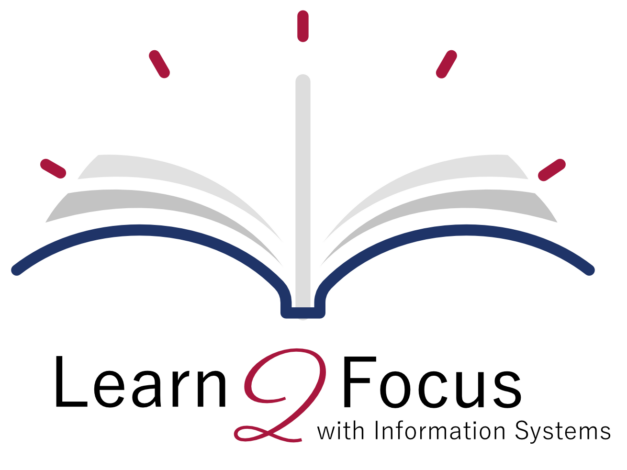
Learn2Focus with Information Systems: Untersuchung des Potenzials motivationaler Informationssysteme gegen Prokrastination im akademischen Kontext
Prokrastination – das absichtliche Aufschieben notwendiger oder wichtiger Aufgaben in dem Wissen, dass dies in der Zukunft negative Folgen haben wird – ist im akademischen Kontext ein weit verbreitetes Phänomen, das bis zu 50-70% aller Studierenden und Forschenden betrifft. Neben offensichtlichen Auswirkungen auf akademische Leistungen geht Prokrastination auch mit ernstzunehmenden Konsequenzen für die mentale Gesundheit der Betroffenen einher. Das Forschungsprojekt „Learn2Focus with Information Systems“ zielt darauf ab, das Potenzial von motivationalen Informationssystemen als neuartige und niedrigschwellige Intervention zur Unterstützung von selbstorganisierter Arbeit im akademischen Kontext zu untersuchen.
Ziele des Projekts:
- Untersuchung der Effekte motivationaler Informationssysteme zur Bekämpfung von Prokrastination bei Studierenden
- Ableitung von Designempfehlungen für die Gestaltung motivationaler Informationssysteme gegen Prokrastination im akademischen Kontext
Das Projekt wird vom Stipendienprogramm zur „Realisierung der Chancengleichheit für Frauen in Forschung und Lehre“ (FFL) der FAU gefördert.
Laufzeit: 1. September 2023 – 31. August 2024
Team: Jeanine Kirchner-Krath
Gestaltung und Evaluation von Gamification-Ansätzen für die Verwendung im Fußballtraining
Zusammen mit adidas wollen wir das Training und die Leistungsdiagnostik im Fußball durch innovative Gamification-Ansätze verbessern. Dafür erforschen wir die Wirkung verschiedener Gamification-Features unter Verwendung einer bestehenden adidas Plattform und Wearable-Devices.
Ziele des Projekts:
- Design und Entwicklung verschiedener Gamification-Features
- Evaluation entwickelter Gamification-Features hinsichtlich sozialpsychologischer Dynamiken im Team und Auswirkungen auf das Verhalten der Fußballspielerinnen und Fußballspieler
- Ableitung von Designempfehlungen und -prinzipien für Gamification im Teamsport basierend auf den Ergebnissen aus Feldexperimenten
Team: Sandra Birnstiel

FontanQuest: Eine Studie zu den Potenzialen spielbasierter Trainingsprogramme für Kinder mit Fontan-Zirkulation
Zusammen mit dem Universitätsklinikum Erlangen erforschen wir die Wirksamkeit und die psychologischen Auswirkungen von spielbasierten Hochintensitäts-Intervalltrainingsprogamme bei Kindern mit Fontan-Zirkulation. Das Vorhaben wird über die Sonderfonds für wissenschaftliche Arbeiten an der FAU der Stadt Nürnberg unterstützt und zusammen mit PD Dr. Dr. med. Isabelle Schöffl von der Kinderkardiologie des Universitätsklinikum Erlangen durchgeführt.

Nachhaltigkeit, spielend einfach!
In Zusammenarbeit mit der Universität Koblenz untersuchen wir, ob und wie Gamification nachhaltiges Mitarbeiterverhalten in Unternehmen fördern kann. Hierzu nutzen wir die von Jeanine Kirchner-Krath entwickelte Gamification-App Greenify.work und erforschen in einem deutschlandweiten Feldexperiment die Wirksamkeit unterschiedlicher Spielelemente auf Mitarbeiterverhalten in verschiedenen Unternehmen und staatlichen Institutionen.
Ziele des Projekts:
- Generierung von Wissen darüber, ob und wie Mitarbeiter und Mitarbeiterinnen durch den Einsatz von Spielelementen, sogenannter „Gamification“, zu nachhaltigem Verhalten am Arbeitsplatz motiviert werden können.
- Untersuchung der Wirkungsweise individueller, kooperativer und kompetitiver Gamification-Ansätze auf psychologische und verhaltensbezogene Auswirkungen.
- Betrachtung des Einflusses der Gamification-Intervention auf nachhaltigkeitsrelevante Kenngrößen von Unternehmen.
Team: Jeanine Kirchner-Krath
Abgeschlossene Forschungsprojekte
Weitere Informationen zu abgeschlossenen Forschungsprojekten folgen in Kürze.
Abschluss- und Projektarbeiten

Offene Themen
Wenn Sie Interesse daran haben, eine Abschlussarbeit oder einer (WING) Projektarbeit zu einem unserer ausgeschriebenen Themen zu verfassen, wenden Sie sich bitte an die angegebene Kontaktperson.
Aktuell sind keine offenen Themen ausgeschrieben
Bitte bewerben Sie sich mit Ihrem Lebenslauf, einem Motivationsschreiben sowie einer Übersicht über bisherige Studienleistungen und Noten!
Aktuelle Forschungsinteressen
Sollte bei den Ausschreibungen kein passendes Thema dabei sein, können Sie auch eigene Themenvorschläge einbringen, die zu unseren Forschungsinteressen passen. Wenn Sie ein eigenes Thema vorschlagen, senden Sie bitte eine Bewerbung mit Beschreibung ihrer Interessen zusammen mit einem Lebenslauf und Notenauszug per Mail an die entsprechende Ansprechperson.
Jeanine Kirchner-Krath
Postdoktorandin
- Gamification, Game-based Learning
- Green Information Systems
- Sustainability
- Employee Motivation, Engagement
Runjie Xie
Doktorand
- Metaverse, virtual worlds, Virtual Reality
- Privacy, cyber bullying, online harassment, ethics, regulation
- User interaction, collaboration
- New internet phenoma
Abgeschlossene Arbeiten und Themen in Bearbeitung
| Typ | Thema | Studentin/Student | Betreuer | Eingereicht |
|---|---|---|---|---|
| Master | How to onboard the user? A study on designing fun on the first click
Game-Designer haben es perfektioniert Nutzer digitaler Spiele bereits ab dem ersten Klick zu begeistern. Dieses Wissen kann auch außerhalb von Spielen die Annahme digitaler Services unterstützen und optimieren. Im Rahmen des Serious-Game „INFLAMMANIA“ möchten wir verschiedene Onboarding-Ansätze erproben und Design-Wissen für die Gestaltung von effektiveren Lern-Spielen erarbeiten. Inflammania ist ein Lernspiel, in dem Entzündungen bei chronischen Erkrankungen bekämpft werden. Ziel dieser Arbeit |
L. Liu | Benedikt Morschheuser | 2.12.2022 |
| Bachelor | Designing Experiments in Roblox | D. Lam | Benedikt Morschheuser | 28.09.2022 |
| Bachelor | Gaming meets Mobility: Gamification in proprietary innovation of the automotive industry
This bachelor thesis presents an overview on the use of gamification in proprietary innovation of the automotive industry based on a structured literature review in the database Espacenet of the European patent |
M. te Lake | Benedikt Morschheuser | 06.08.2021 |
| Bachelor | Creators of the Metaverse – Who are they and what drives them to build virtual worlds?
Using qualitative interviews with N=14 participants, this thesis examines who creates content in the metaverse and what reasons and motives drive content creators. |
M. Bitz | Benedikt Morschheuser | 25.04.2022 |
| Master WING Projektarbeit | Does adaptive gamification increase motivation and participation in gamified crowdsourcing? An experiment in a text-based adventure game for collecting handwriting data
In collaboration with the STABILO International GmbH, we developed a text-based adventure for the STABILO DigiPen and empirically evaluated whether personalized gamification experience produce better outcomes in gamified crowdsourcing compared to one-size-fits-all approaches. |
M. Weber | Benedikt Morschheuser | 31.3.2022 |
| Bachelor | The intrinsic drivers of content creators in the Metaverse – a quantitative study
This thesis examines the intrinsic motivations of content creators related to word of mouth (WOM) and the intention to continue creating content on and for the Metaverse platform Roblox. The results are compared to the findings of previous studies of content creators of Web 2.0 platforms. Data for this study was collected using an online survey of 50 content creators of Roblox and was analyzed using structural equation modeling in SmartPLS. Based on the uses and gratifications theory (U&G), the study provides first insights of a quantitative approach exploring the intrinsic motivations of people creating for the Metaverse Roblox, trying to build the most renowned virtual 3D worlds and games, meet people or to hang out. |
F. Feldmeier | Benedikt Morschheuser | 30.3.2022 |
| Bachelor | Gamified Cycling: A literature review and future agenda | F. Gast | Benedikt Morschheuser | 29.9.2022 |
| Master | Perspective Switching in Human-AI Teaming – An Empirical Investigation of the Effects of Perspective Switching on AI Technology Acceptance
Recently there is an increasing importance of AI and Robotics in organizations and everyday life, but existing barriers prevent the widespread adoption of AI. Human-Robot-Interaction is widely used in industrial applications, e.g., picking and placing in production lines. So far, the market for personal domestic and service robots, or social robots, is comparably small. Still, mainly domestic and social robots will likely become increasingly prevalent and penetrate our everyday lives. During the Covid-19 pandemic, quarantine measures, contact restrictions, and home office have led to increased social isolation. Social isolation is a risk factor for loneliness and impairing mental health. The use of social robots can potentially prevent or at least minimize these negative consequences. In this master thesis, we investigate the impact of an audio-visual perspective switching exercise on the technology acceptance of a social robot measured by the Technology Acceptance Model by Davis. We also incorporate other related constructs, such as anxiety, perceived enjoyment, and perceived sociability. As a social robot for the experiment, we chose the so-called Gatebox, which is developed and manufactured by the Japanese tech company Vinclu. Gatebox is a virtual home robot that accompanies its owner in everyday life. Azuma Hikari represents an AI assistant; she not only communicates with her voice but is a holographically depicted anime girl who inhabits the Gatebox. In times of a global pandemic and increasing social isolation, the Gatebox is not only a home assistant that is supposed to make everyday life easier but also a social robot companion with which the user lives together. By measuring the constructs before and after the exercise, we would like to determine what impact Perspective Switching has on technology acceptance. The results can inspire the design and implementation of future HRI/HAI systems. |
L. Köhler | Maximilian Wittmann | 4.10.2022 |
| Master | Gamification in Inbound Logistics – master thesis in cooperation with Lidl Stiftung & Co. KG | J. Steif | Benedikt Morschheuser | 13.2.2023 |
| Master WING Projektarbeit | Gamification in performance diagnostics and training of team sports | G. Sußner | Benedikt Morschheuser | 13.5.2023 |
| Bachelor | Creators of the Metaverse: Why people build virtual worlds in their spare time – a quantitative study | T. Müller | Benedikt Morschheuser | 28.3.2023 |
| Master | Perspective Switching in Human-AI Teaming
Artificial Intelligence (AI) is considered as one of the most important enablers of industry 4.0. Thanks to increasing computing power and the availability of large amounts of valuable data, AI can be used on a large scale in the manufacturing industry. AI can be perceived in different forms. It can have a physical representation. One example are AI-powered robots on the shop floor that are responsible for assembly tasks. But it can also be invisible and embedded in software, such as predictive maintenance software. However, there is still a long way to go before AI is implemented from pilot projects into practice, because there are several obstacles to the introduction of AI-based systems. One main obstacle is people’s lack of trust in AI. This may be due to cognitive barriers. Powerful AI uses complex algorithms. Ordinary users, however, often perceive AI as a “black box” because it is difficult to comprehend an AI’s decision making. In addition, emotional barriers exist. These barriers include, for instance, the fear of being replaced by a robot. To overcome this impediment, a concept from recent research in game design seems very promising, namely perspective switching. Game developers implement elements of perspective switching between human players and Non-Player-Characters (NPC) to improve cooperation and trust. In this way, the NPC can be viewed as a team member rather than a mere tool. Implementing perspective switching as a design pattern is also powerful to elicit feelings towards NPCs as it can help human players to identify and sympathize more easily with the NPC. We will apply this concept to human-AI-interaction in the manufacturing industry to assess if it is possible to achieve the same effect as in the game industry. To carry out this study, a game prototype will first be developed in Roblox, in which the player and a cooperative robot work together to complete tasks on the shopfloor of a manufacturing facility. The unique feature of the game is the player’s ability to switch perspective with the robot. Our research model is based on the Technology Acceptance Model by Davis. To test our hypotheses and investigate the impact of perspective switching on employees’ attitudes toward AI, experiments will be conducted with a few voluntary participants. Pre- and post-game survey data will be collected and analyzed using statistical software. The insights of this work can inspire the design of future human-AI-cooperation scenarios in a manufacturing environment. |
R. Xie | Maximilian Wittmann | 01.08.2024 |
| Master | Designing and understanding the effects of gamified VR training on human-robot teaming | M. Weber | Benedikt Morschheuser | 4.10.2022 |
| Master | Women in game design: How does game design target actual cross-pressure topics in religion and how would we design and counter such issues? | H. Qarani | Benedikt Morschheuser | 2.03.2023 |
| Master | How to gamify football training? An explorative analysis of user demands and synthesis of design patterns | L. Steinkamp | Benedikt Morschheuser | 23.6.2023 |
| Master | Privacy in the metaverse | S. Fang Chen | Benedikt Morschheuser | 02.09.2024 |
| Master | Triumph Over Tragedy? A Scoping Review about Gameful Interventions for Crisis and Disaster Preparedness |
C. Wüllner | Benedikt Morschheuser | 01.12.2023 |
| Master | Gamification of team sports: Impact of using gamification elements on group dynamics in football | R. Rehm | Sandra Birnstiel | 13.11.2023 |
| Master | Avatarize Your Quantified Self: Exploring the Impact of Avatar Identification on Football Self-Efficacy | S. Reiß | Sandra Birnstiel | 24.01.2023 |
| Master | Can Curiosity-Focused Gamification Increase User Engagement? An Empirical Study in the Context of Corporate Innovation Management | A. Hollendonner | Benedikt Morschheuser | 19.12.2023 |
| Master | Gamification in Sports – Examining the needs of different athletes Gamification can improve performance in sport and also make sport more fun by meeting the needs of athletes. But what are the needs of different athletes? Do individual and team athletes have the same needs? And what about people who don’t play sport at all?To answer these questions, a study will be designed, carried out and evaluated. |
J. Balint | Sandra Birnstiel | 30.09.2024 |
| Master | Data Privacy in the Metaverse: Effects of Avatar Design and Information Transparency on User Perceptions | S. Merk | Benedikt Morschheuser | 05.06.2024 |
| Master | Game-based learning in the Metaverse – an empirical study with the serious game Inflammania 3D | A. Kwiatek | Benedikt Morschheuser | 19.12.2024 |
| Bachelor | Wie gehen Unternehmen mit den ethischen Herausforderungen von Gamification um? | D. Büttner | Gürtler, Christian Benedikt Morschheuser |
22.12.2023 |
| Bachelor | Gameful crisis preparedness in the metaverse: A systematic analysis of user-generated games in Roblox |
M. Eitel | Runjie Xie | 15.01.2025 |
| Master | Motivating children to exercise using gamified health apps – an experimental study on emotional attachment to virtual companions | H. Jakobi | Benedikt Morschheuser | |
| Master project | A Study on Applying Perspective Switching to Foster Student’s Acceptance of a Robot Teaching Assistant | S. Elias Damas | Benedikt Morschheuser Maximilian Wittmann |
15.11.2024 |
| Master | Game-based Learning in Music Education: Development and Evaluation of an Educational Mobile App for Pitch Recognition Training | C. Jheman Martinez | Benedikt Morschheuser | 16.12.2024 |
Stellenangebote

Sie sind interessiert an Forschung im Bereich Gamification, Games, Digital Customer Experience, eCommerce, Crowdsourcing, AR/VR, eSports, Metaverse, Mensch-Computer-Interaktion, neue Medien…?
Dann schauen Sie sich unsere Stellenausschreibungen an oder schreiben Sie eine Initiativbewerbung:
Wissenschaftliches Personal
Vielen Dank für Ihr Interesse an unserer Forschungsgruppe. Derzeit haben wir keine offenen Stellen ausgeschrieben. Wir sind jedoch stets daran interessiert, mit talentierten und motivierten Wissenschaftlerinnen und Wissenschaftlern in Kontakt zu treten, die Teil unserer Forschungsgruppe werden möchten. Wir bieten Unterstützung bei der Bewerbung auf internationale Promotionsstellen, z.B. in Zusammenarbeit mit der finnischen Gamification Group, sowie Bewerbungen auf Promotionsförderprogramme.
Für erfahrene Wissenschaftlerinnen und Wissenschaftler bieten wir Unterstützung bei der Bewerbung auf attraktive Marie Skłodowska-Curie Stipendien der Europäischen Union und weitere Stipendienprogramme.
Wissenschaftliche Hilfskräfte
Die Forschung und Lehre unserer Forschungsgruppe ist regelmäßig auf der Suche nach wissenschaftlichen Hilfskräften. Sie sind Student:in an der FAU und haben Interesse Teil unseres Teams zu werden? Dann schreiben Sie uns eine Mail mit einem Lebenslauf, Notenauszug und einer Übersicht Ihrer Fähigkeiten, Ihrer Motivation und präferierten Tätigkeiten.
Aktuelle Stellenangebote
Keine offenen Stellen gefunden
Nichts dabei, aber dennoch neugierig:
Angebote von Industriepartnern
Zur Zeit keine Stellenangebote vorhanden.
Publikationen

Beiträge in Fachzeitschriften
- , , , :
Gameful systems for corporate sustainability: systematic review, conceptual framework and research agenda on gamification and sustainable employee behavior in companies
In: Internet Research (2024)
ISSN: 1066-2243
DOI: 10.1108/INTR-06-2024-1000
URL: https://www.emerald.com/insight/content/doi/10.1108/intr-06-2024-1000 - , , , , , , , , :
Uncovering the theoretical basis of user types: An empirical analysis and critical discussion of user typologies in research on tailored gameful design
In: International Journal of Human-Computer Studies 190 (2024), Art.Nr.: 103314
ISSN: 1071-5819
DOI: 10.1016/j.ijhcs.2024.103314
URL: https://www.sciencedirect.com/science/article/pii/S1071581924000983 - , , :
Proteus effect or bodily affordance? The influence of virtual high-heels on gait behavior
In: Virtual Reality 28 (2024), S. 1-19
ISSN: 1359-4338
DOI: 10.1007/s10055-024-00966-5
URL: https://link.springer.com/article/10.1007/s10055-024-00966-5 - , , , , , :
Challenges in the adoption of sustainability information systems: A study on green IS in organizations
In: International Journal of Information Management (2024), Art.Nr.: 102754
ISSN: 0268-4012
DOI: 10.1016/j.ijinfomgt.2024.102754
URL: https://www.sciencedirect.com/science/article/pii/S0268401224000021 - , , , :
Altruism or egoism – How do game features motivate cooperation? An investigation into user we-intention and I-intention
In: Behaviour & Information Technology (2023)
ISSN: 0144-929X
DOI: 10.1080/0144929X.2023.2196581 - , , , :
Gamification of cooperation: A framework, literature review and future research agenda
In: International Journal of Information Management 67 (2022)
ISSN: 0268-4012
DOI: 10.1016/j.ijinfomgt.2022.102549 - , , :
Is it a tool or a toy? How user’s conception of a system’s purpose affects their experience and use
In: International Journal of Information Management 49 (2019), S. 461−474
ISSN: 0268-4012
DOI: 10.1016/j.ijinfomgt.2019.07.016
URL: https://urn.fi/URN:NBN:fi:tuni-202011167971 - , , :
Cooperation or competition – When do people contribute more? A field experiment on gamification of crowdsourcing
In: International Journal of Human-Computer Studies 127 (2019), S. 7−24
ISSN: 1071-5819
DOI: 10.1016/j.ijhcs.2018.10.001
URL: https://urn.fi/URN:NBN:fi:tuni-202011167972 - , :
The gamification of work: Lessons from crowdsourcing
In: Journal of Management Inquiry 28 (2019), S. 145−148
ISSN: 1056-4926
DOI: 10.1177/1056492618790921
URL: https://urn.fi/URN:NBN:fi:tuni-201911216163 - , , , :
How to design gamification? A method for engineering gamified software
In: Information and Software Technology 95 (2018), S. 219−237
ISSN: 0950-5849
DOI: 10.1016/j.infsof.2017.10.015
URL: https://urn.fi/URN:NBN:fi:tuni-201911216151 - , , , :
How games induce cooperation? A study on the relationship between game features and we-intentions in an augmented reality game
In: Computers in Human Behavior 77 (2017), S. 169−183
ISSN: 0747-5632
DOI: 10.1016/j.chb.2017.08.026
URL: https://urn.fi/URN:NBN:fi:tuni-201911216148 - , , , :
Gamified crowdsourcing: Conceptualization, literature review, and future agenda
In: International Journal of Human-Computer Studies 106 (2017), S. 26−43
ISSN: 1071-5819
DOI: 10.1016/j.ijhcs.2017.04.005
URL: https://urn.fi/URN:NBN:fi:tuni-201911216147 - , , , :
Gamifizierung mit BPMN
In: HMD : Praxis der Wirtschaftsinformatik 52 (2015), S. 840−850
ISSN: 1436-3011
DOI: 10.1365/s40702-015-0188-3 - , , , :
Interaction and reflection with quantified self and gamification: An experimental study
In: The Journal of Literacy and Technology 15 (2014), S. 136−156
ISSN: 1535-0975
Open Access: http://www.literacyandtechnology.org/uploads/1/3/6/8/136889/vr.pdf
URL: http://www.literacyandtechnology.org/uploads/1/3/6/8/136889/vr.pdf - , , , :
Can Gamification Foster Trust-Building in Human-Robot Collaboration? An Experiment in Virtual Reality
(2025)
DOI: 10.1007/s10796-024-10573-z
Beiträge bei Tagungen
- , , , :
Leaf your Chair Behind - Calm Persuasion for Frequent Sitting Breaks Among Office-Workers
2024 Mensch und Computer, MuC 2024 (Karlsruhe, DEU, 1. September 2024 - 4. September 2024)
In: ACM International Conference Proceeding Series 2024
DOI: 10.1145/3670653.3670681 - :
Social Gamification in Team Sports - Design Concept and Preliminary Evaluation
Mensch und Computer 2024 (Karlsruhe, 1. September 2024 - 4. September 2024)
In: Gesellschaft für Informatik e.V. (Hrsg.): Workshopband 2024
DOI: 10.18420/muc2024-mci-ws01-138
URL: https://dl.gi.de/items/27c84001-67e9-4f13-b87e-f382d8291426 - , , :
Towards an Ethical Metaverse: A Systematic Literature Review on Privacy Challenges
Proceedings of the Thirty-Second European Conference on Information Systems (ECIS 2024) (Paphos, 13. Juni 2024 - 19. Juni 2024)
In: ECIS 2024 Proceedings 2024
URL: https://aisel.aisnet.org/ecis2024/track15_social_ict/track15_social_ict/6 - , , , , , :
Outplay Your Weaker Self: A Mixed-Methods Study on Gamification to Overcome Procrastination in Academia
2024 CHI Conference on Human Factors in Computing Sytems, CHI 2024 (Hybrid, Honolulu, HI, 11. Mai 2024 - 16. Mai 2024)
In: Florian Floyd Mueller, Penny Kyburz, Julie R. Willamson, Corina Sas, Max L. Wilson, Phoebe Toups Dugas, Irina Shklovski (Hrsg.): CHI '24: Proceedings of the CHI Conference on Human Factors in Computing Systems, New York, NY: 2024
DOI: 10.1145/3613904.3642048 - , , :
Influence of Virtual Shoe Formality on Gait and Cognitive Performance in a VR Walking Task
IEEE VR 2024: The 31st IEEE Conference on Virtual Reality and 3D User Interfaces (Orlando, Florida, USA, 16. März 2024 - 21. März 2024)
DOI: 10.1109/VR58804.2024.00122
URL: https://ieeexplore.ieee.org/document/10494159 - , :
Exploring gamification in team sports: a scoping review and research agenda
8th International GamiFIN Conference (Ruka, Finnland, 2. April 2024 - 5. April 2024)
URL: https://ceur-ws.org/Vol-3669/paper4.pdf - , , :
Combating Procrastination with Information Systems: A Systematic Review on Design Approaches and Effects
Thirty-Second European Conference on Information Systems (ECIS 2024) (Paphos, 13. Juni 2024 - 19. Juni 2024)
In: ECIS 2024 Research Papers 2024 - , , , :
Designing Gamification for Team Sports: Mapping of the Problem Space and Design Recommendations
Thirty-Second European Conference on Information Systems (ECIS 2024) (Paphos, 13. Juni 2024 - 19. Juni 2024)
URL: https://aisel.aisnet.org/ecis2024/track14_esports/track14_esports/1 - :
Exploring the Effect of Anthropomorphic Design on Trust in Industrial Robots: Insights from a Metaverse Cobot Experiment
21st International Conference on Ubiquitous Robots, UR 2024 (New York, NY, USA, 24. Juni 2024 - 27. Juni 2024)
In: 2024 21st International Conference on Ubiquitous Robots, UR 2024 2024
DOI: 10.1109/UR61395.2024.10597479 - , , :
I = Robot: An Investigation of How Perspective Switching Can Support People’s Acceptance of AI-Powered Social Robots
IEEE International Conference on Robot and Human Interactive Communication (RO-MAN) (Busan, 28. August 2023 - 31. August 2023)
In: Proceedings of the 32nd IEEE International Conference on Robot and Human Interactive Communication (RO-MAN) 2023
DOI: 10.1109/RO-MAN57019.2023.10309478 - , , , :
The role of territorial behavior in shaping user engagement on enterprise collaboration platforms
Fifth German Human Factors Summer School (Chemnitz, 25. September 2023 - 26. September 2023)
In: Lewis Chuang, Ann-Christin Hensch, Elisabeth Wögerbauer, Julian Bornemeier (Hrsg.): Proceedings of the 5th German Human Factors Summer School 2023 2023
DOI: 10.5281/zenodo.10490095 - , :
Exploring the metaverse as a catalyst for human-AI collaboration
StartPlay 2023 (Wuppertal, 28. September 2023 - 28. September 2023)
In: Manuel Löwer, Tim Katzwinkel und David Kessing (Hrsg.): Proceedings of the 2nd Interdisciplinary Conference on Gamification and Innovation 2023
DOI: 10.25926/BUW/0-211 - , , , , , , :
Inflammania 3D: Exploring the Use of the Metaverse Platform Roblox for Science Communication
7th Annual International GamiFIN Conference 2023 (Lapland, 18. April 2023 - 21. April 2023)
In: Presented poster at the 7th Annual International GamiFIN Conference 2023, 18-21 April 2023, Lapland, Finland 2023
Open Access: https://opus4.kobv.de/opus4-fau/frontdoor/index/index/docId/23201
URL: https://opus4.kobv.de/opus4-fau/frontdoor/index/index/docId/23201 - , , , :
AI-assisted learning with ChatGPT and large language models: Implications for higher education
The 23rd IEEE International Conference on Advanced Learning Technologies (ICALT 2023) (Orem, 10. Juli 2023 - 13. Juli 2023)
DOI: 10.1109/ICALT58122.2023.00072 - , , , , :
Designing Pedagogical Conversational Agents in Virtual Worlds
21. Fachtagung Bildungstechnologien der Gesellschaft fur Informatik e.V., DELFI 2023 - 21st Conference on Educational Technologies of the German Informatics Society, DELFI 2023 (Aachen, DEU, 11. September 2023 - 13. September 2023)
In: Rene Ropke, Ulrik Schroeder (Hrsg.): Lecture Notes in Informatics (LNI), Proceedings - Series of the Gesellschaft fur Informatik (GI) 2023
DOI: 10.18420/delfi2023-29 - , , , , , , :
Designing tailored gamification: A mixed-methods study on expert perspectives and user behavior in a gamified app for sustainability at work
7th International GamiFIN Conference (Levi, Finnland, 18. April 2023 - 21. April 2023)
In: Proceedings of the 7th International GamiFIN Conference 2023
Open Access: https://ceur-ws.org/Vol-3405/
URL: https://ceur-ws.org/Vol-3405/ - , , , :
How to increase sustainable engagement in the workplace through green IS: The role of instructional and motivational design features
31st European Conference on Information Systems (ECIS) (Kristiansand, 12. Juni 2023 - 16. Juni 2023)
In: ECIS 2023 Research Papers 2023
Open Access: https://aisel.aisnet.org/ecis2023_rp/244
URL: https://aisel.aisnet.org/ecis2023_rp/244 - , , :
Is adaptive gamification just a theoretical fairytale? An experiment in a text-based adventure game for data crowdsourcing
Hawaii International Conference on System Sciences (HICSS) (Maui, Hawaii, 3. Januar 2023 - 6. Januar 2023)
In: Proceedings of the 56th Hawaii International Conference on System Sciences (HICSS) 2023
DOI: 10125/102768
URL: https://hdl.handle.net/10125/102768 - , :
Understanding human factors in the metaverse - an autonomous driving experiment
European Conference on Information Systems (ECIS) (Timișoara)
In: ECIS 2022 Research-in-Progress Papers 2022
URL: https://aisel.aisnet.org/ecis2022_rip/37 - , :
What do games teach us about designing effective human-AI cooperation? - A systematic literature review and thematic synthesis on design patterns of non-player characters
GamiFIN Conference 2022 (Tampere, FI, 26. April 2022 - 29. April 2022)
In: Mila Bujić, Jonna Koivisto, Juho Hamari (Hrsg.): Proceedings of the 6th International GamiFIN Conference 2022
Open Access: http://ceur-ws.org/Vol-3147/paper10.pdf
URL: http://ceur-ws.org/Vol-3147/paper10.pdf - , , :
Designing gamification for sustainable employee behavior: Insights on employee motivations, design features and gamification elements
Hawaii International Conference on System Sciences 2022 (HICSS 2022) (Maui, HI, 3. Januar 2022 - 7. Januar 2022)
In: Tung X. Bui (Hrsg.): Proceedings of the 55th Hawaii International Conference on System Sciences 2022
DOI: 10.24251/HICSS.2022.198
URL: https://hdl.handle.net/10125/79530 - , , , :
Gamifying sustainable behavior at work: Results from an experiment with a corporate gamification app
30th International Conference on Information Systems Development (ISD2022) (Cluj-Napoca)
In: R. A. Buchmann, G. C. Silaghi, D. Bufnea, V. Niculescu, G. Czibula, C. Barry, M. Lang, H. Linger, & C. Schneider (Hrsg.): Information Systems Development: Artificial Intelligence for Information Systems Development and Operations 2022
URL: https://aisel.aisnet.org/isd2014/proceedings2022/usability/3/ - , , , :
Measuring the effects of virtual environment design on decision-making
2021 IEEE Conference on Virtual Reality and 3D User Interfaces Abstracts and Workshops, VRW 2021
DOI: 10.1109/VRW52623.2021.00103
URL: https://ieeexplore.ieee.org/abstract/document/9419338 - , , , :
How game features give rise to altruism and collective action? Implications for cultivating cooperation by gamification
Hawaii International Conference on System Sciences 2020 (HICSS 2020) (Maui, HI, 7. Januar 2020 - 10. Januar 2020)
In: Tung X. Bui (Hrsg.): Proceedings of the 53rd Hawaii International Conference on System Sciences 2020
DOI: 10.24251/hicss.2020.086
URL: https://hdl.handle.net/10125/63825 - , , , :
First-hand experience of why gamification projects fail and what could be done about it
GamiFIN Conference 2018 (Pori, 21. Mai 2018 - 23. Mai 2018)
In: Jonna Koivisto, Juho Hamari (Hrsg.): Proceedings of the 2nd International GamiFIN Conference 2018
Open Access: http://ceur-ws.org/Vol-2186/paper17.pdf
URL: http://ceur-ws.org/Vol-2186/paper17.pdf - , , , :
How to gamify? A method for designing gamification
Hawaii International Conference on System Sciences 2017 (HICSS 2017) (Big Island, HI, 3. Januar 2017 - 7. Januar 2017)
In: Tung X. Bui, R. H. Sprague Jr. (Hrsg.): Proceedings of the 50th Hawaii International Conference on System Sciences 2017
DOI: 10.24251/HICSS.2017.155
URL: https://hdl.handle.net/10125/41308 - , , :
Designing cooperative gamification: Conceptualization and prototypical implementation
CSCW '17: Computer Supported Cooperative Work and Social Computing (Portland, Oregon, 25. Februar 2017 - 1. März 2017)
In: Proceedings of the 2017 ACM Conference on Computer Supported Cooperative Work and Social Computing 2017
DOI: 10.1145/2998181.2998272
URL: https://opus4.kobv.de/opus4-fau/frontdoor/index/index/docId/17445 - , , :
Gamification in crowdsourcing: A review
Hawaii International Conference on System Sciences 2016 (HICSS 2016) (Kauai, HI, 5. Januar 2016 - 8. Januar 2016)
In: Ralph H. Sprague Jr., Tung X. Bui (Hrsg.): Proceedings of the 49th Hawaii International Conference on System Sciences 2016
DOI: 10.1109/HICSS.2016.543
URL: https://ieeexplore.ieee.org/document/7427729 - , , :
Increasing intranet usage through gamification – Insights from an experiment in the banking industry
Hawaii International Conference on System Sciences 2015 (HICSS 2015) (Kauai, HI, 5. Januar 2015 - 8. Januar 2015)
In: Tung X. Bui, Ralph H. Sprague Jr. (Hrsg.): Proceedings of the 48th Hawaii International Conference on System Sciences 2015
DOI: 10.1109/HICSS.2015.83
URL: https://nbn-resolving.org/urn:nbn:de:bvb:29-opus4-178761 - , , , :
Gamifying quantified self approaches for learning: An experiment with the Live-Interest-Meter
The PLE Conference 2013: Learning and Diversity in the Cities of the Future (Berlin, 10. Juli 2013 - 12. Juli 2013)
In: Ilona Buchem, Graham Attwell, Gemma Tur (Hrsg.): Proceedings of the 4th International Conference on Personal Learning Environments 2013
Open Access: http://pleconf.org/2013/files/2014/10/v5.0_PLE_Conference2013_ResearchReport_BeuthUniversity_MonashUniversity.pdf
URL: http://pleconf.org/2013/files/2014/10/v5.0_PLE_Conference2013_ResearchReport_BeuthUniversity_MonashUniversity.pdf
Beiträge in Sammelwerken
- , , :
Gamification: Motiviertes Lehren und Lernen spielend leicht gemacht
In: Michael Ernst-Heidenreich, Claudia Quaiser-Pohl, Frauke Sorajewski, Annika Werger (Hrsg.): Digitalisierung in der Schule. Ein Praxisbuch zu Möglichkeiten, Grenzen und Herausforderungen, Beltz Juventa, 2024, S. 82-97
ISBN: 978-3-7799-7706-3
Open Access: https://www.beltz.de/fachmedien/paedagogik/produkte/details/52157-digitalisierung-in-der-schule.html
URL: https://www.beltz.de/fachmedien/paedagogik/produkte/details/52019-digitalisierung-in-der-schule.html - , , , :
Online Educational Escape Rooms – Ein Fallbeispiel
In: Lorenz Mrohs, Julia Franz, Dominik Herrmann, Konstantin Lindner, Thorsten Staake (Hrsg.): Digitale Kulturen der Lehre entwickeln: Rahmenbedingungen, Konzepte und Werkzeuge, Springer Link, 2024, S. 223–244
DOI: 10.1007/978-3-658-43379-6_15
URL: https://link.springer.com/chapter/10.1007/978-3-658-43379-6_15 - , , , :
Gamification as a Catalyst to the Circular Economy
In: Lehtimäki Hanna, Aarikka-Stenroos Leena, Jokinen Ari, Jokinen Pekka (Hrsg.): The Routledge Handbook of Catalysts for a Sustainable Circular Economy, London: Routledge, 2023, S. 642
ISBN: 9781003267492
Open Access: https://www.taylorfrancis.com/books/oa-edit/10.4324/9781003267492/routledge-handbook-catalysts-sustainable-circular-economy-hanna-lehtimäki-leena-aarikka-stenroos-pekka-jokinen-ari-jokinen
URL: https://www.taylorfrancis.com/books/oa-edit/10.4324/9781003267492/routledge-handbook-catalysts-sustainable-circular-economy-hanna-lehtimäki-leena-aarikka-stenroos-pekka-jokinen-ari-jokinen - , , , :
Gamifizierung mit BPMN
In: Susanne Strahringer, Christian Leyh (Hrsg.): Gamification und Serious Games: Grundlagen, Vorgehen und Anwendungen, Wiesbaden: Springer Vieweg, 2017, S. 31−42 (Edition HMD)
ISBN: 9783658167417
DOI: 10.1007/978-3-658-16742-4_3 - , , :
Outsourcing: Die Standardisierung gewinnt an Relevanz
In: Wilhelm Niehoff, Stefan Hirschmann (Hrsg.): Aspekte einer effizienten Bankorganisation, die-bank, 2015, S. 98–103
ISBN: 9783865564276
Bücher
- , , , , :
Banking 2020 - zwischen Individualisierung und Standardisierung.
2014
ISBN: 978-3-033-04538-5
URL: https://www.researchgate.net/profile/Benedikt-Morschheuser/publication/263444216_Banking_2020_-_zwischen_Individualisierung_und_Standardisierung/links/57c411cc08aee50192e87ce2/Banking-2020-zwischen-Individualisierung-und-Standardisierung.pdf
Abschlussarbeiten
- :
Gamification for Sustainable Employee Behavior: A Design Science Research Study (Dissertation, 2023)
URL: https://uko.opus.hbz-nrw.de/frontdoor/index/index/docId/2435 - :
The gamification of crowdsourcing systems: Empirical investigations and design (Dissertation, 2017)
URL: https://publikationen.bibliothek.kit.edu/1000074115/5503157
Unveröffentlichte Publikationen / Preprint
- , , , :
Crisis Preparedness Through Casual Gaming? - A Self-Efficacy Perspective (Beitrag bei einer Tagung, accepted)
AMCIS 2025 (Montréal, 14. August 2025 - 16. August 2025)
In: AMCIS 2025 Proceedings 2025
Patente
- Verfahren zum Bereitstellen von Informationen betreffend Parkplätze (Schutzrecht: DE102015211051A1)
Erfinder:
Personen
…der Mensch spielt nur, wo er in voller Bedeutung des Worts Mensch ist, und er ist nur da ganz Mensch, wo er spielt.
Friedrich Schiller, 1795
Assoziierte Forscher
Marc Riar
Assoziierter Wissenschaftler
Maximilian Wittmann
Assoziierte Wissenschaftler
Lin Lin
Assoziierte Wissenschaftlerin
Lehre

Lehrveranstaltungen
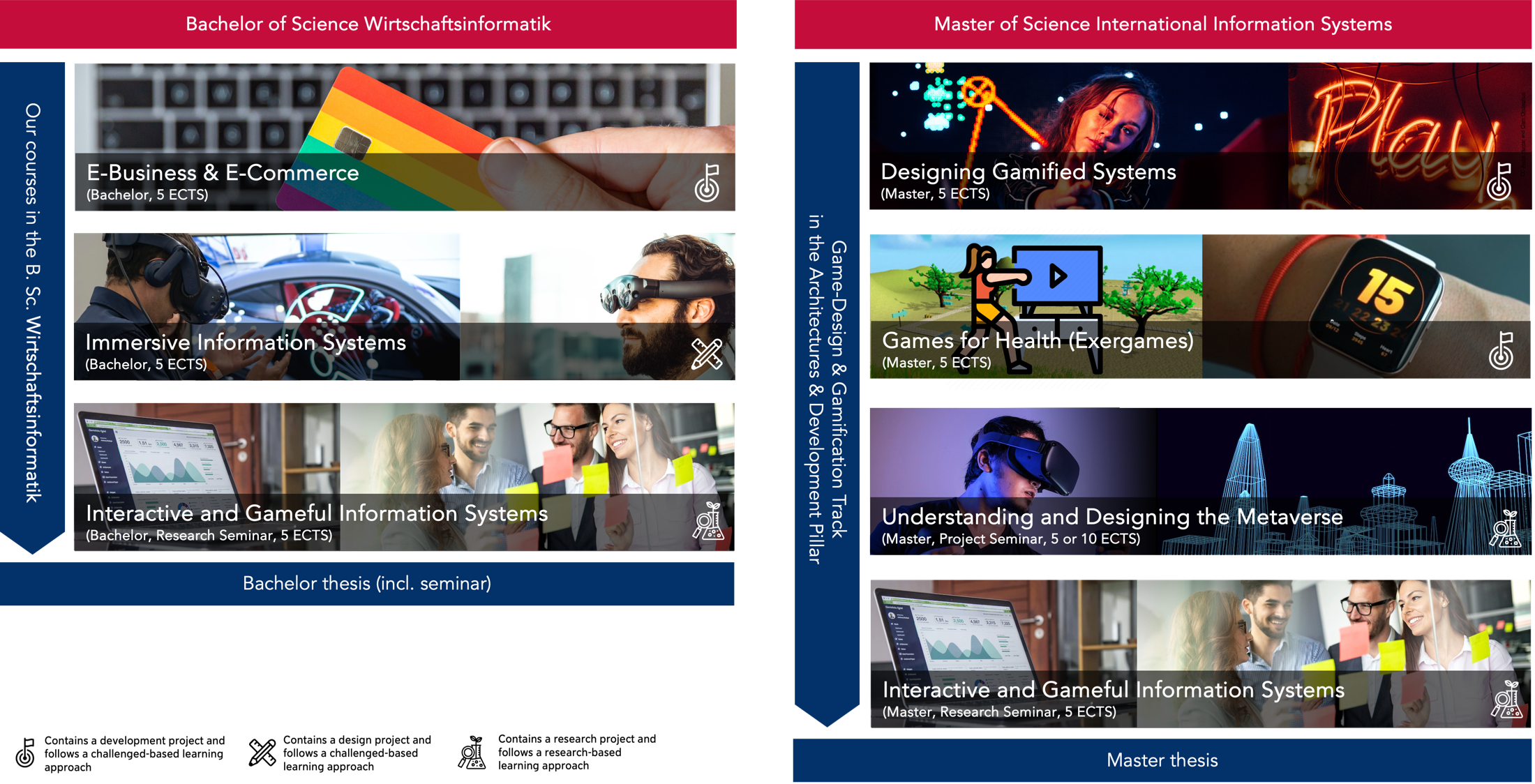
Forschungsschwerpunkte

We create impactful scientific knowledge about the ongoing penetration of society, technology, economy and everyday life with digital games and emerging phenomena of the gaming industry in order to better understand these developments and to support society and organizations in solving problems in a ‘gameful‘ way
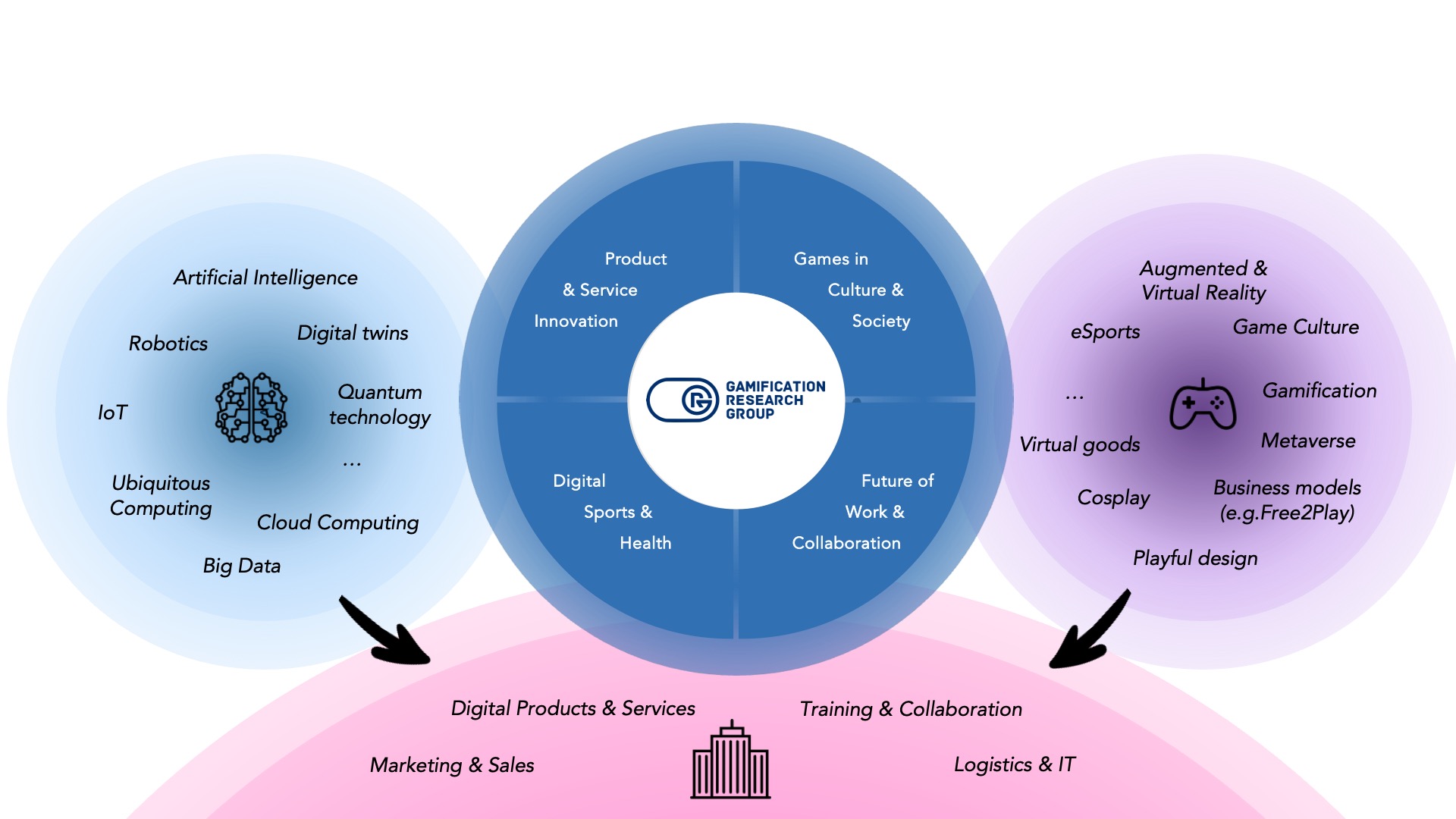
Eine Auswahl unserer Forschungsschwerpunkte und -interessen:
Gaming meets Product & Service Design
- Designing gamified information systems
- Motivational design
- Game design patterns
- Game thinking
- Gamified crowdsourcing and co-creation
- Personalized gamification
- Gamification of future mobility and transportation (e.g. in-car gaming)
Gaming meets Marketing & Sales
- Digital customer engagement
- Customer steering in the omni-channel
- Loyalty programs
- Virtual goods and commerce in the Metaverse
- Customer insights, gamers/players as customers
Gaming meets Work & Collaboration
- Gamification in technology-mediated collaboration e.g. crowdsourcing, remote work
- Gamification for creativity and ingenuity
- Serious and educational games
- Gamification in organizational transformation initiatives
- Human-AI teaming and collaboration
- Work and education in the „Metaverse“
- Gamifying sustainable behavior at work
Gaming meets Sports & Health
- Gamification of exercise, sports & quantified-self
- Virtual and augmented reality in sports
- Location-based games
- eSports
- Gamification in corporate health
- Gamification of prevention, therapy and rehabilitation
Gaming meets Society and Culture
- Inclusive and accessible games and gamification
- Ethics of gamification
- Gamification to prevent and counter radicalization and extremism
- Data Privacy in the Metaverse
- Understanding the creator economy
